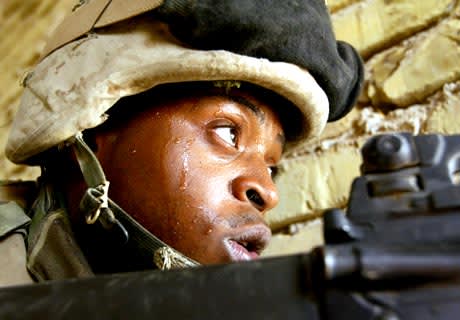Michael Moore's Fahrenheit 9/11 was hobbled by stridency, sloppiness and an inability to see the forest for the trees: he became so obsessed with the individual transgressions of Bush/Cheney/Rumsfeld that he failed to see the decades-old structures that had swept them into power. Thus it's up to Andrew Jarecki to see where those structures came from, how they work and why people continue to buy into their military-industrial complex lies.
Jarecki's Why We Fight traces things back to WWII, when American power was at its zenith and the armaments industry had become entrenched enough to flex political muscle even Eisenhower was powerless to check their might, and warned the public in his farewell address in 1961.
Jarecki then demonstrates through expert witnesses like Gore Vidal and Gwynne Dyer that the tail of industry is wagging the dog of government, with arms manufacturers and conservative think tanks inventing the policies that will ensure them fat paycheques. Above, he maps the ideology of greed that motivates these actions; below, he shows the father of a bereaved 9/11 victim and a financially strapped enlistee caught in their machinations.
To be sure, Why We Fight has its structural problems and often circles around an issue instead of going in for the kill, but once all the cards are on the table the portrait is lucid and damning of the American way of war. And unlike Moore's efforts, there's no personality to get in the way or extraneous cheap shots to add self-righteousness. Jarecki simply sets out the facts, stands back and shows you the disaster that results. See it twice. (Mongrel Media)
Jarecki's Why We Fight traces things back to WWII, when American power was at its zenith and the armaments industry had become entrenched enough to flex political muscle even Eisenhower was powerless to check their might, and warned the public in his farewell address in 1961.
Jarecki then demonstrates through expert witnesses like Gore Vidal and Gwynne Dyer that the tail of industry is wagging the dog of government, with arms manufacturers and conservative think tanks inventing the policies that will ensure them fat paycheques. Above, he maps the ideology of greed that motivates these actions; below, he shows the father of a bereaved 9/11 victim and a financially strapped enlistee caught in their machinations.
To be sure, Why We Fight has its structural problems and often circles around an issue instead of going in for the kill, but once all the cards are on the table the portrait is lucid and damning of the American way of war. And unlike Moore's efforts, there's no personality to get in the way or extraneous cheap shots to add self-righteousness. Jarecki simply sets out the facts, stands back and shows you the disaster that results. See it twice. (Mongrel Media)
